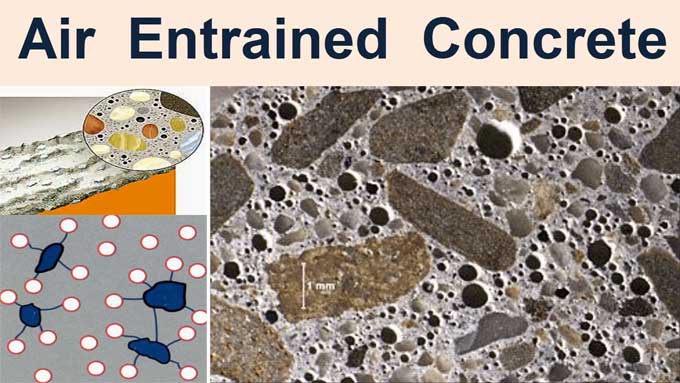
Air Entrainment effects on Concrete Strength

Air entrainment affects the compressive strength of concrete and its workability. It increases the concrete workability without much increase in the water-cement ratio.
The compressive strength of concrete is inversely proportional to the workability of concrete. If the workability of concretes increases, then its compressive strength decreases.
Therefore, concrete workability cannot increase to improve concrete placement and compaction since it declines concrete strength.
In this case, an air-entraining admixture adds to increase workability without adding water. However, the introduction of air entrainment shall thoroughly study its influence on concrete properties, concrete strength.
Effect of Air Entrainment on Concrete Strength
The air entrainment influences on concrete strength include:
1. Air Entrainment on Concrete Compressive Strength effect
2. Air Entrainment on Concrete Flexural Strength effect
Effect of Air Entrainment on Concrete Compressive Strength
Air entraining admixture introduces when it desires to increase concrete workability without affecting much reduction in compressive strength. It claims that the place-ability of an air-entrained concrete having a 7.5 cm slump is better than a non-air entrained concrete with a slump of 12.5 cm.
By and large, the compressive strength of concrete reduces by the use of air-entrained admixture. Reduction is used in concrete strength by use of air-entrained admixtures varies from 3 to 7%. This strength variation shall be considered in the mixed concrete design so that a desired compressive strength achieve with the required amount of admixture and workability.
Suitably, trial mix designs find an exact strength variation with this admixture use, and suitable corrections should do in mix design to ensure desired strength. Typically, it may assume that a loss of 5% in compressive strength of concrete occurs due to each 1% by volume of entrained air in the concrete mix.
Estimate the ratio of water and cement requires for air-entrained concrete, an allowance for strength reduction incorporates in the mix design. Higher target mean strength is assumed.
Effect of Air Entrainment on Flexural Strength of Concrete
Generally, the influence of air entrainment on the flexural strength of concrete is not as detrimental as in the case of concrete compressive strength. It reports that maximum flexural strength can achieve even with an air content of 4%.
It shows that the flexural strength of lean concrete mix increases provided that the maximum water reduction considers and small aggregate size is employed.
To get more details, go through the following video tutorial.
Video Source: Anime_Edu - Civil Engineering Videos


